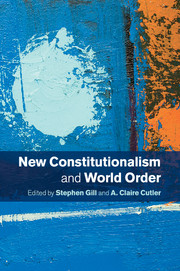Book contents
- Frontmatter
- Contents
- List of Figures
- List of Contributors
- Acknowledgements
- List of Acronyms
- 1 New constitutionalism and world order
- Part I Concepts
- Part II Genealogy, origins and world order
- Part III Multilevel governance and neo-liberalization
- Part IV Trade, investment and taxation
- Part V Social reproduction, welfare and ecology
- Part VI Globalization from below and prospects for a just new constitutionalism
- 17 Constitutionalism as critical project
- 18 New constitutionalism and geopolitics
- Glossary
- Appendix
- Bibliography
- Index
18 - New constitutionalism and geopolitics
Notes on legality and legitimacy and prospects for a just new constitutionalism
from Part VI - Globalization from below and prospects for a just new constitutionalism
Published online by Cambridge University Press: 05 February 2014
- Frontmatter
- Contents
- List of Figures
- List of Contributors
- Acknowledgements
- List of Acronyms
- 1 New constitutionalism and world order
- Part I Concepts
- Part II Genealogy, origins and world order
- Part III Multilevel governance and neo-liberalization
- Part IV Trade, investment and taxation
- Part V Social reproduction, welfare and ecology
- Part VI Globalization from below and prospects for a just new constitutionalism
- 17 Constitutionalism as critical project
- 18 New constitutionalism and geopolitics
- Glossary
- Appendix
- Bibliography
- Index
Summary
New constitutionalism is the complex framework that systemizes the norms, prevailing practices and institutional procedures designed to produce order favoured and generated by dominant economic and political elites, whether presiding over governmental structures or administering a range of non-state actors, especially those that are market based. Stephen Gill articulates this innovative and prescriptive orientation towards constitutionalism with a primary reference to the operational logic of the world economy in this era of neo-liberal globalization (1998b, 2008: 161–76). Here I propose extending the scope of new constitutionalism to encompass security, criminal accountability and environment, especially as policy and behaviour of others are impacted by the global domination project of the United States in the early twenty-first century. I regard these issue areas to be organically linked, as an extension of global economic disciplinary policies, procedures and institutional arrangements designed to liberalize trade, facilitate investment, encourage resource exploitation and take advantage of commodity markets. These initiatives would have a secondary objective of diverting public attention from environmental deterioration, and containing mounting opposition to political moves that diminish prospects for profitability and capital accumulation.
Indeed, new constitutionalism depends heavily on the selective application of global norms and procedures and the adaptation of the institutional arrangements set up after the Second World War under the sway of the old constitutionalism, e.g. as associated with the UN Charter. New constitutionalism operates on the basis of double standards that exempt geopolitical actors from many mechanisms of accountability for wrongful and criminal acts. As such, world order structures combine states, markets and the geopolitical control mechanisms with a pervasive bias toward privatization to underpin the new constitutionalism. Nonetheless, these top-heavy features of globalization are being challenged mainly from below by rising popular forces dedicated to a more equitable distribution of the benefits of economic development, a more or less regulated world order in relation to political violence, and a visionary endorsement of global democracy as necessary and attainable.
- Type
- Chapter
- Information
- New Constitutionalism and World Order , pp. 295 - 312Publisher: Cambridge University PressPrint publication year: 2014
- 4
- Cited by

